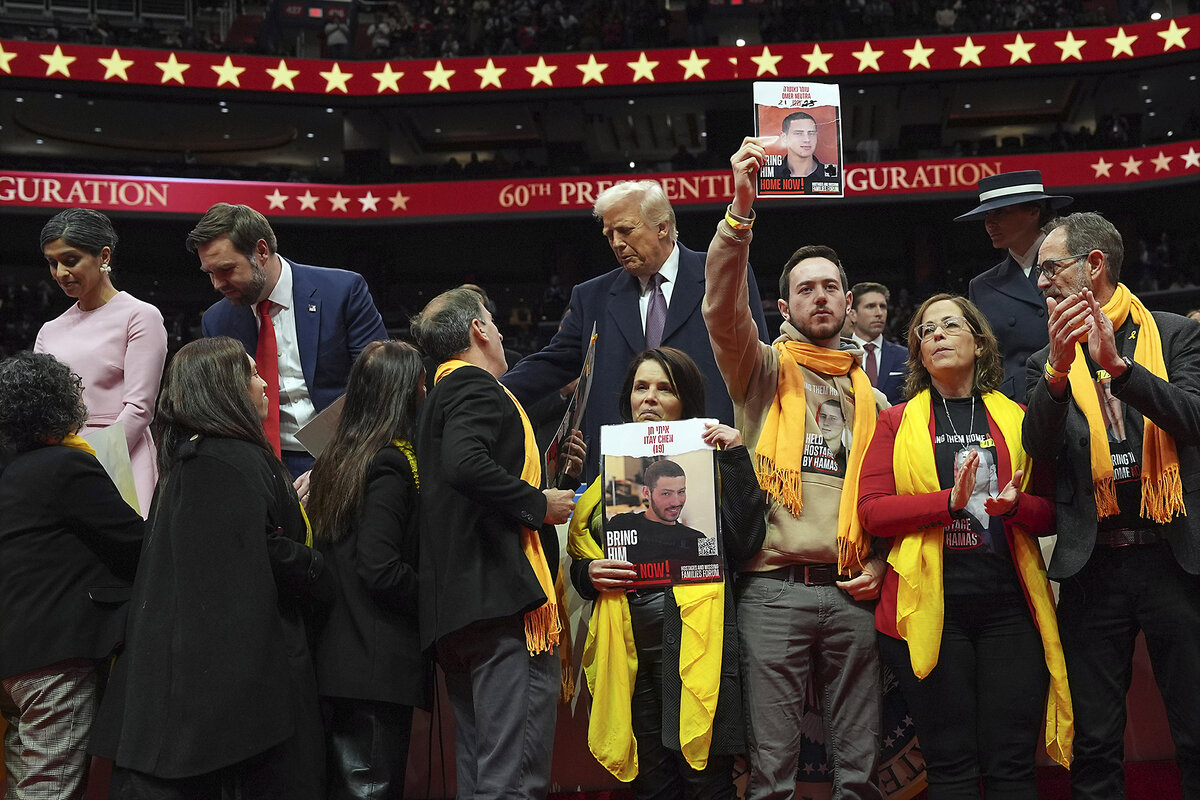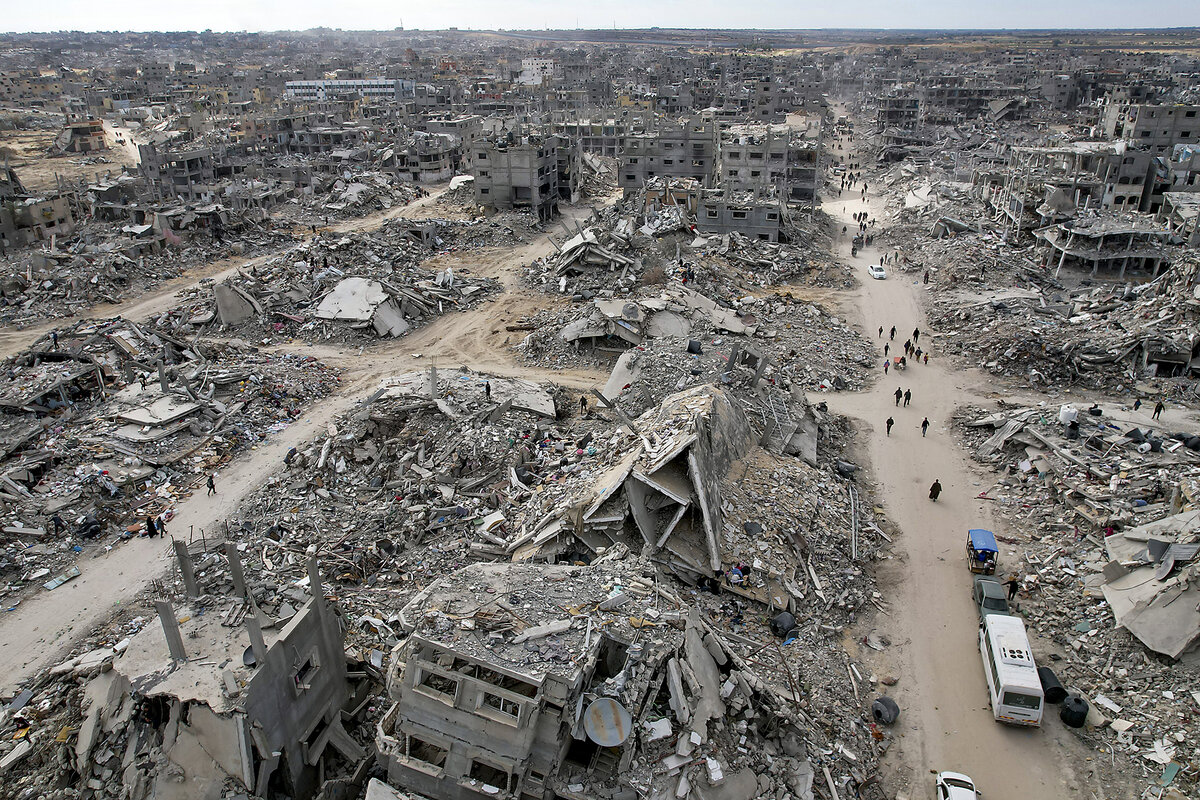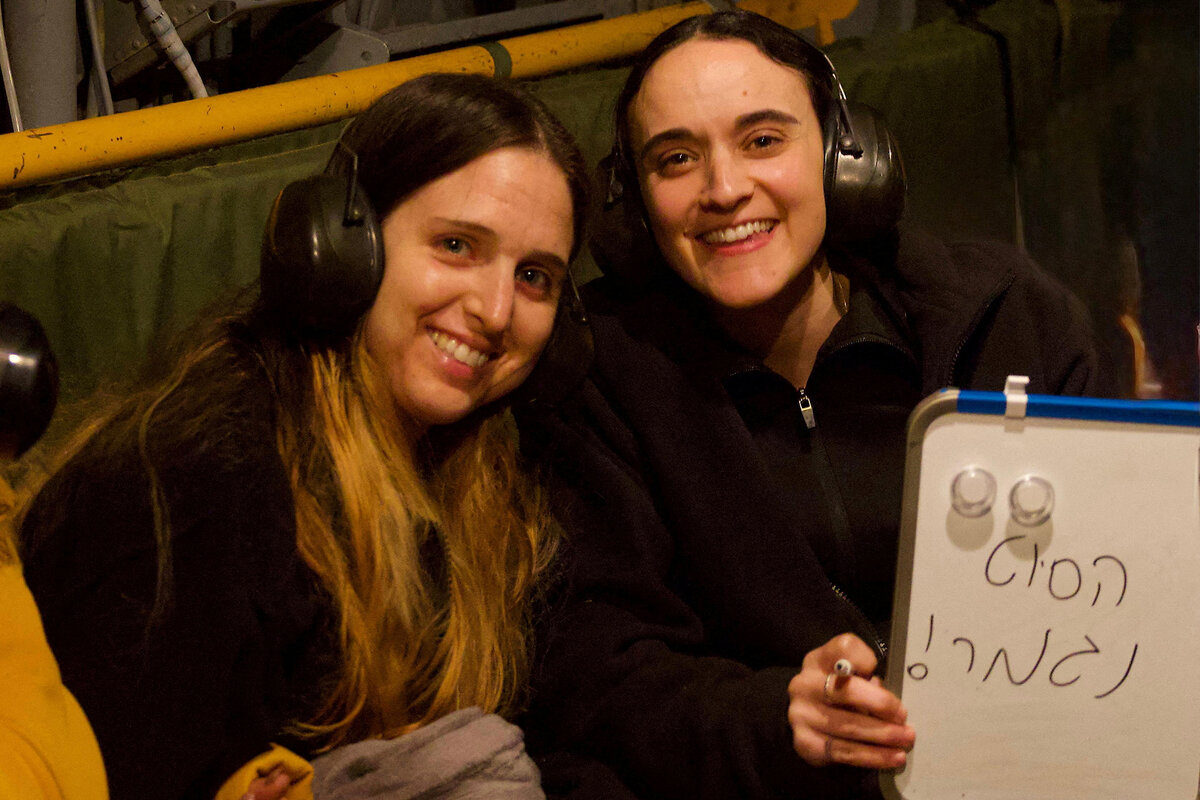Will Trump keep Gaza ceasefire afloat? A guide to his calculations.
Loading...
Donald Trump returned to the White House Monday with a ceasefire in place in Gaza and with bragging rights for getting an elusive deal across the finish line even before he took office.
With many diplomats and Middle East analysts affirming it was the “Trump effect” that enabled a ceasefire pausing Israel’s longest war and the deadly destruction of Gaza, the dealmaker president might have been expected to proudly add this prize to his trophy case.
But with this kind of victory comes ownership – and the hard part of making a complex deal work. Already within hours of his inauguration, President Trump was distancing himself from a conflict he does not consider central to U.S. national security interests.
Why We Wrote This
A story focused onWhat resources and time will Donald Trump’s “America First” administration devote to keeping the Israel-Hamas deal on track? The challenges may appear overwhelming, but the idea of a grand deal is enticing.
Declaring from the Oval Office that he is “not confident” the Gaza ceasefire will last, Mr. Trump said, “It’s not our war, it’s their war.”
He is not alone in predicting a rough road ahead for the deal.
The initial six-week first phase of the agreement will be hard enough, experts say. It includes the twinning of a phased release of hostages held by Hamas with that of Palestinian prisoners in Israel, a resumption of largescale humanitarian aid shipments into Gaza, the redeployment of Israeli forces, and other potential pitfalls.
Then there are the even thornier successive stages meant to advance governance, rebuilding, and security arrangements for Gaza.
Trump’s “deal of the century”
But one key factor determining success – or a collapse and return to fighting – will be how much time and energy Mr. Trump decides this conflict warrants, these experts say.
Indeed some analysts, including some who have worked with the president, say with all the other priorities the new Oval Office occupant has for his first 100 days, Gaza on its own wouldn’t rank highly.
Except for one thing. Mr. Trump is keen on achieving normalized relations between Israel and Saudi Arabia, which he sees as a step toward his “deal of the century.”
Mr. Trump has indicated he believes a broad Middle East peace plan anchored by Israeli-Saudi normalization paves the way to his dream of being awarded the Nobel Peace Prize.
And none of that happens without the Palestinians and a lasting ceasefire in Gaza.
“If the Saudis are saying, ‘We’re ready for normalization [with Israel] but we need things to happen in Gaza,’ that draws Trump’s interest,” says Dennis Ross, a distinguished fellow at the Washington Institute for Near East Policy and a Mideast peace envoy for several presidents.
“If [Trump] didn’t have the Saudi normalization [goal],” he adds, “I’m not sure he cares much about what happens in Gaza.”
Others anticipate a busy incoming president making a quick assessment of the ceasefire deal’s prospects and determining how important the deal is to other issues he’s keen to address.
China, the Gulf countries, and especially Iran are all likely to be higher priorities, says Elliott Abrams, a senior fellow for Middle Eastern Studies at the Council on Foreign Relations in Washington.
“How much energy, how much time, how much capital does Trump really want to invest in this problem?” says Mr. Abrams, who served as special representative for Iran and Venezuela in the first Trump White House.
President Trump may indeed want “the deal of the century,” but he’s not going to expend much energy on what Mr. Abrams deems a “mess” of a problem if issues like Gaza’s governance and Palestinian leadership are going nowhere.
“Trump will make a judgment as to whether this [ceasefire plan] is really doable, and if he thinks it is, he’ll tell [Secretary of State Marco] Rubio and [Middle East envoy Steve] Witkoff, ‘Get to work!’ But he may conclude it isn’t doable right now,” he says.
“If six months from now there is more combat in Gaza, I don’t think that’s a top item for the Trump administration,” he adds.
Iran as complicating factor
On the other hand, if Israel is not bogged down in Gaza, it is more likely to have the bandwidth to address Iran and its steadily progressing nuclear program. And that will be an issue of key importance to the Trump administration, Mr. Abrams says.
Does a Gaza ceasefire create “a window for Israel to attack Iran’s nuclear program?” he asks. “That is perhaps the biggest security question of 2025.”
Mr. Trump has made it clear he wants an end to wars that have drawn in the United States, such as Gaza and Ukraine. He is almost certain to resist being dragged into a costly conflict between Israel and Iran that risks sparking a regional conflagration, many regional analysts say.
Indeed, in recent weeks Mr. Trump spoke of his desire to reach a deal with Iran on its nuclear program that makes military intervention unnecessary. In his confirmation hearing last week, Secretary Rubio acknowledged Iran’s steady progress producing weapons-grade uranium, but reiterated the president’s preference for a negotiated settlement.
For its part, Iran – significantly weakened by the routing of Hezbollah and Hamas and the drubbing it took in the fiery tit-for-tat with Israel last year – is sending signals that it, too, is open to a deal.
Iran’s president, Masoud Pezeshkian, and other senior officials have recently reached out to European officials and Trump aides to make their openness to talks known. But the window for any negotiations is likely to be relatively brief, analysts say, since President Trump is expected to return to the “maximum pressure campaign” he imposed on Iran in his first term.
Yet any quick turn by the Trump administration to renewed talks with Iran are not going to sit well with Israel, and particularly with Prime Minister Benjamin Netanyahu, who would look warily on any new U.S.-Iran negotiations.
“The Israelis are worried about this,” says Mr. Abrams, who adds that the negotiations Mr. Trump seems likely to favor could lead him to restrain the Israelis.
“Maybe he goes for it”
Mr. Trump’s keen interest in a deal with Iran, coupled with the complexities and poor prospects of the Gaza ceasefire, could seal the fate of the Gaza plan ever becoming a true peace deal, some experts conclude.
For one thing, the initial Trump team is not heavy on seasoned diplomats adept at the complex art of reaching and sustaining complex peace agreements. Mr. Witkoff “was sent in more as an enforcer than as someone who’s engaging in negotiation,” says Steven Cook, senior fellow for Middle East and Africa studies at the Council on Foreign Relations.
In any case, Mr. Cook says, he considers so many of the “pathways” to a comprehensive Middle East peace plan closed – for example, the creation of a Palestinian state, which Saudi Araba insists upon – that he is dubious of anyone’s ability to mastermind a deal.
“If I was advising the president, I would say, this is going to get you wrapped around the axle for four years and not get you the Nobel Peace Prize,” Mr. Cook says.
But he adds that such warnings may not deter Mr. Trump.
“Trump sees himself as a master dealmaker. I can talk … for hours about nationalism and historical memory and identity and religion,” he says, but “Trump looks at a map and says, ‘This is a real estate deal!’ So maybe he goes for it.”









